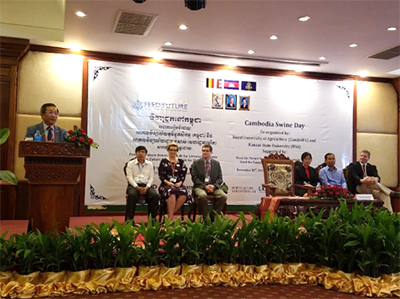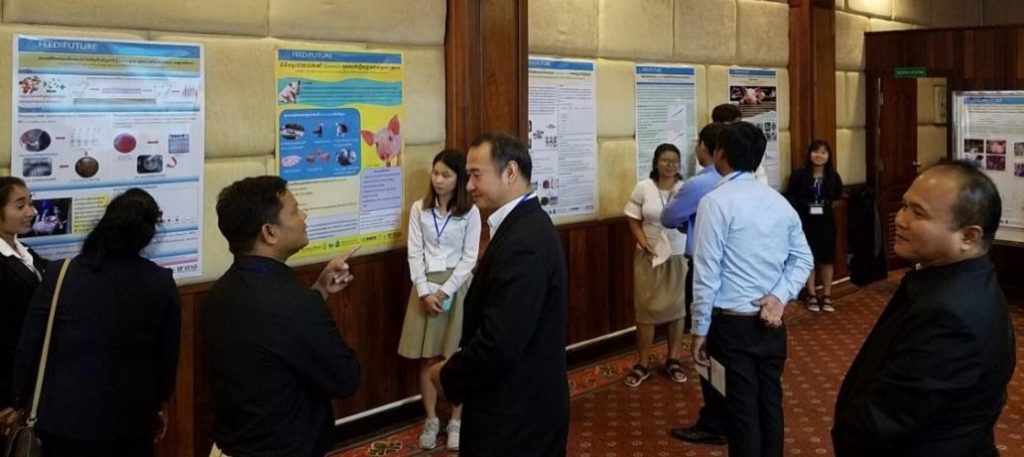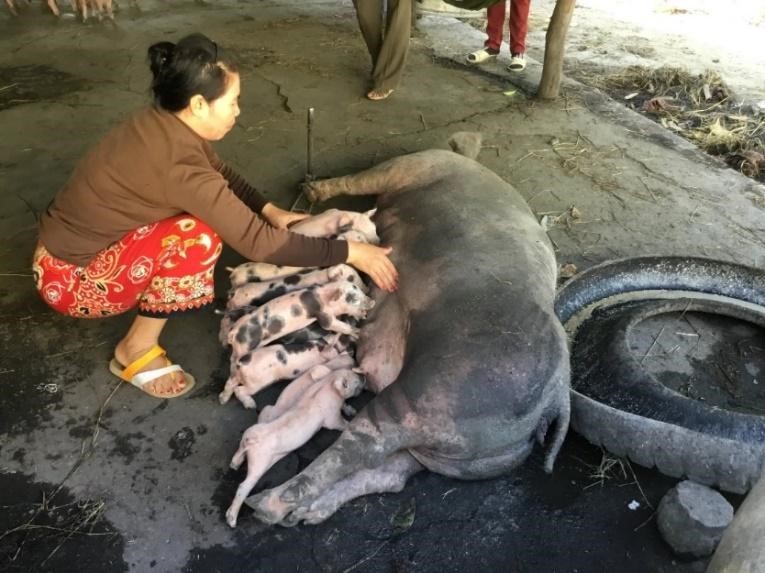
In April 2019, the Cambodian government confirmed the presence of African Swine Fever, which is extremely fatal to pigs and has spread into nine east Asian countries since 2018. The disease can devastate the holdings of pig farmers, but humans cannot be infected.
How should pig farmers in Cambodia prepare themselves for this threat and other challenges? A major step forward in educating smallholder Cambodian pig farmers and other stakeholders of the pork value chain took place on November 30, 2018. The first Cambodian “Swine Day” event welcomed 179 attendees and armed them with knowledge about diseases, biosecurity, and the nutrition of pigs.
Because of Swine Day’s success, Cambodia’s Ministry of Agriculture plans to integrate it into the country’s yearly Livestock Day. Swine Day originated with a research project supported by the Feed the Future Innovation Lab for Livestock Systems and led by Dr. Michael Tokach from Kansas State University (KSU). Swine Days have been an annual tradition at KSU since 1968. The event in Cambodia was co-organized by KSU and Cambodia’s Royal University of Agriculture and co-supported by two Feed the Future Innovation Labs devoted to livestock and to horticulture.
Featuring a full day of presentations and demonstrations, Cambodia’s inaugural Swine Day was held in Siem Reap, a city in the country’s northwest and a gateway to the famed ruins of Angkor Wat.
Concept to Execution

The idea for Swine Day emerged after initial project surveys in 2017 found that stakeholders were eager for disease transmission education. A concept note in 2018 targeted two objectives: to share recent findings from the project’s research and experiments, and to convene diverse stakeholders to exchange current knowledge about pig nutrition and diseases.
Swine Day featured 14 presentations, in a mixture of English and Khmer languages, by more than 20 local and international experts in swine nutrition, production, diseases, and marketing. In addition, 15 Cambodian students competed with scientific posters and won prizes from Cambodia’s Centre of Excellence on Sustainable Agricultural Intensification and Nutrition. Of the 179 attendees, 59 were female and 120 were male, and 57 farmers represented the largest subgroup.
Did It Work?
After the event, all participants agreed that the training increased their personal or organization’s capacity, according to the event evaluation. Also, 95 percent felt that it increased their understanding of swine nutrition and feeding practices, and 97 percent gained knowledge about food safety and the status of the swine industry in Cambodia. In other words, it worked.
While Swine Day was a singular event, the project has held many other extension activities. In early 2019 alone, 198 people (74 Village Animal Health Workers, 71 farmers, and 53 students) attended trainings on biosecurity, nutrition, and swine diseases.
The Project’s Scope

The project that organized 2018’s Swine Day, Improved pig health and nutrition: the major drivers of profitability and sustainability for smallholder farmers in Cambodia, conducted research from July 2017 to May 2019. Currently, it is producing fact sheets in Khmer and at least five journal articles about feed ingredients, an experiment on supplement replacement (demonstrating $10/pig profit within 42 days), biosecurity, animal health products, and experiential learning. It supported 27 Cambodian students pursuing degrees, and overall it trained 568 people directly.
 0
0
